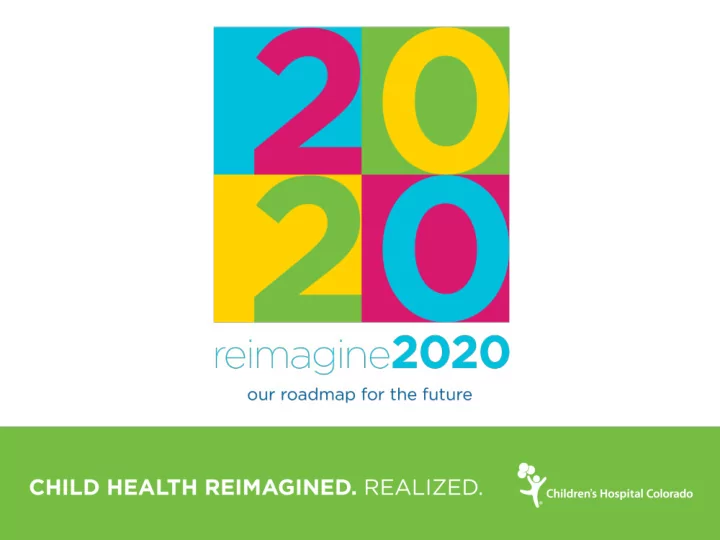

Child Health Advocacy Institute Community Health Action Plan CREATING A COMMUNITY BASED PARTNER DRIVEN NETWORK OF CARE
Top Issues Impacting the Health of Colorado Springs’ Children Community Driven Priorities Data Driven Priorities
COMMUNITY HEALTH ACTION PLAN: Our Community PATIENT POPULATION 8 county region Geographic Locations Ward 1 of Aurora (Main Campus) Douglas County (South Campus)
Top Issues Impacting the Health of Children in the Denver Metro Region Community Driven Priorities Data Driven Priorities
We Have Identified Our Goals: Mental Health 1. Educate about and reduce stigma associated with mental health 2. Promote healthy social-emotional development for children ages 3-18 3. Increase access to mental health services
We Have Identified Our Goals: Obesity Goal 1: Educate and empower families across the lifecycle with the skills and information they need to make behavior changes that support a healthy lifestyle Goal 2: Improve access to healthy foods and physical activity for children and their families, particularly in underserved communities Goal 3: Advance the field of childhood obesity research through collaboration and dissemination
We Have Identified Our Goals: Oral Health Goal 1: Increase Access to Oral Health Care Goal 2: Educate and empower families to about oral health in provider, community and home settings
We Have Identified Our Goals: Injury Goal 1: Strengthen and expand the hospital-based and community-based education and outreach components of the Child Passenger Safety (CPS) Program at Children’s Hospital Colorado Goal 2: Expand programmatic efforts, and facilitate opportunities for collaborative injury prevention initiatives focusing on teen driver safety Goal 3: Focus programming efforts on the four leading causes of unintentional injury among children residing in targeted neighborhoods. 9
We Have Identified Our Goals: Prematurity Goal 1: Increase public awareness about the importance of prenatal care and early childhood development Goal 2: Advocate for policy changes that would positively influence conditions in pregnancy and early childhood Goal 3: Increase healthcare provider awareness and understanding of the importance of gestation through age 2 Goal 4: Identify families with psychosocial concerns and provide supports and services to address needs Goal 5: Expand partnerships with pre-natal providers in order to reduce premature births
We Have Identified Our Goals: Respiratory Illness Goal 1: Increase access to routine care for respiratory illnesses Goal 2: Strengthen network in clinical and community settings Goal 3: Decrease impact of environmental exposure to air particulate matter 11
How did we develop our plan? How will it work? SET THE SCOPE UNDERSTAND COMMUNITY CAPACITY PICK THE SETTING/DELIVERY MECHANISM PICK THE PARTNERS DESIGN THE METRICS DELIVER THE SERVICES INCORPORATE INTO VALUE BASED PAYMENTS EVALUATE THE OUTCOMES WHERE DO WE START?
With Millions Living In Our Communities We Chose to Limit Our Scope We worked with the Colorado Health Institute to create the Child Health Severity Index
The Child Severity Index Helped Us Identify Target Zip Codes Targeted Zip Codes Aurora 80010, 80011 Adams 80221, 80260 Douglas 80104 Jefferson 80235 Broomfield 80501 Denver 80216, 80219
We Have Identified Provider Resources in Our Surrounding Target Zip Codes 15
We Have Identified Community Resources in Our Target Zip Codes Community Map 16
We Have Picked the Settings We Will Provide Services, Programs and Resources
Our Plan Is Comprehensive
Our Plan Has Critical Core Components Parent and Caregiver Training and Education Provider Training and Education Increasing Access to Services Linking families in need to services, programs and resources Bi-directional community partner training, education and support Policy and Advocacy
We Have Selected our Delivery Mechanisms: Community Based Provider Network • Target providers serving a high percentage of Medicaid • Build Community based provider network • Create Shared pools of community based resources 20
We Created a “Pay For” Strategy: Volume to Value Payment Model Evolution Full Capitation Partial Capitation Shared Savings Upside Only Bundled and/or Payments Downside Bonus/ Incentive/ Fee-for- P4P Service
We have a Plan to Evaluate Outcomes Tied Directly to Community Identified Needs CHCO Programs & Services Community Payer Need + Interest & Capacity Need METRICS 22
Zip Codes 80010-11 • Identify Community Partners working in and/or supporting targeted school and neighborhood – Churches – Schools – Child Care Providers – Health Alliance – Family Resource Center(s) – Boys and Girls Club – Rec Center(s) – Community Mental Health Center 23
Zip Codes 80010-11 • Convene community partners to share project idea and data, learn about community dynamics and solicit partnership – I.D. other data points that could be informative and collected – Have partners assist in the development of the network 24
Zip Codes 80010-11 • Team up with Major Medicaid Providers in RCCO 3 – MCPN – Aurora Mental Health – Rocky Mountain Youth – DAWN Clinic 25
Zip Codes 80010-11 • Develop Plans For Creating Shared Pools of Resources – Community Health Workers – Call Center – Care Coordinator/Family Navigator – IT Infrastructure 26
Zip Codes 80010-11 Community Based Medicaid Provider Network • Maximize payments under current incentive structures • Evolve toward Value Based Payment Models 27
OUTCOME CHILD HEALTH REIMAGINED. REALIZED. 28
Recommend
More recommend